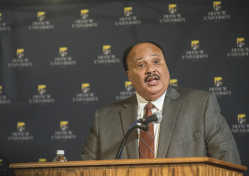'Lessons of Leadership' still resonate 50 years after JFK assassination, 'Dream' speech, King III says
By ERIC BERNSEE
Editor
Visiting DePauw University on the eve of the 50th anniversary of the assassination of President John F. Kennedy, guest speaker Martin Luther King III, oldest son of slain civil rights leader Dr. Martin Luther King Jr., paused to reflect on what might have been.
If Kennedy and Dr. King, who was slain in 1968, had lived and created even more lasting legacies, how would America and the world be different today, he was asked.
"Oh, my goodness," he said, slowly exhaling those words to a small group of media representatives attending a pre-lecture press conference at the Inn at DePauw late Thursday afternoon, "this would be a totally different nation."

The issue of poverty in America, he suggested, might not be the concern it is today. "At the very least," King said, "we would be minimizing it."
War, terrorism, racism and violence might also have been lessened over the intervening years by the lessons of leadership men like Kennedy and King provided and would have continued to impart upon the country and the world, King III implied.
"We would have perhaps a different world structure," he suggested, "without the militarism we see today."
Later Thursday King presented an Ubben Lecture titled "Reflections on the 50th Anniversary of Two Pivotal Events: My Father's 'Dream' and JFK in Dallas" to a packed Meharry Hall in DePauw's East College. The venue was a little more than a stone's throw from where his famed father addressed a Gobin Memorial United Methodist Church audience on Sept. 5, 1960.
"It is important that we make sure the lessons of leadership JFK and my father exemplified are not lost," the 56-year-old King who earned three standing ovations during his address stressed, adding that it is vital "we see to it that each new generation picks up the fallen mantle and carries it forward into the future."
Focusing on the infamous date of Nov. 22, King called Friday "a momentous anniversary loaded with significance and meaning."
At the day's earlier press conference, the Ubben lecturer admitted he could not remember where his famous father was or what he was doing at the moment Kennedy was shot in 1963.
"I should know that," he offered, "but I just can't recall."
Being only six years old at the time, King said he nonetheless could sense that the Kennedy's assassination "caused a profound transformation of our country."
"In one day," he noted, "we had gone from the optimistic spirit that was called Camelot, with all of the hope that was embodied in President Kennedy's New Frontier initiatives, to widespread despair and pessimism about the future."
Calling Kennedy "a man of extraordinary grace and vision with a wonderful wit," King termed the assassination "a soul-shattering experience for millions of Americans."
As America paused to remember the tragedy of Nov. 22, 1963, King noted, "The epitaph of John Kennedy reveals that he was a leader unafraid of change. He came to the presidency at one of the most turbulent and cataclysmic periods of human history, a time when the problems of the world were gigantic and intense and chaotic in detail."
King also suggested that the "sincere grief expressed by so many millions was more than a simple emotion."
It revealed, he said, "that President Kennedy had become a symbol of people's yearning for justice, economic well being and peace."
"It should also be said," King added, "that President Kennedy rose to the challenge -- certainly regarding civil rights -- and by the time he was assassinated, President Kennedy was regarded by millions of African Americans as a friend to our freedom struggle and a leader who sincerely cared about securing racial justice and equality as a priority for America."
Three months before the president's death, King's father delivered his most famous speech at the Aug. 28, 1963 March on Washington. Speaking to more than 250,000 assembled civil rights supporters, Dr. King declared, "I have a dream" in an address most scholars consider the best American speech of the 20th century.
Thursday night at DePauw, Dr. King's son recalled the March on Washington "one of the most uplifting milestones of American history -- the day when our nation embraced a vibrant vision of interracial unity, social justice and harmony that still inspires people all over the world."
"The vision of unity my father shared with the nation that he loved on that day 50 years ago remains a widely taught value in schools across America," King added.
"But the part of the speech where he talks about the urgency of connecting racial and social injustices through disciplined non-violence is too often glossed over ... That's a problem," he added, "because you can't fulfill the dream without an active commitment to address poverty, racism and violence with organized non-violent resistance."
King called upon DePauw students to "understand our interconnectedness" and work to make the world a better place.
He also urged students to embrace President Kennedy's "living legacy and immortal example by engaging in public service."
"John F. Kennedy did not live to complete even one term as president," King pointed out, "but he helped prepare America for an era of unprecedented progress toward racial equality and inspired millions of young Americans to serve their country."
